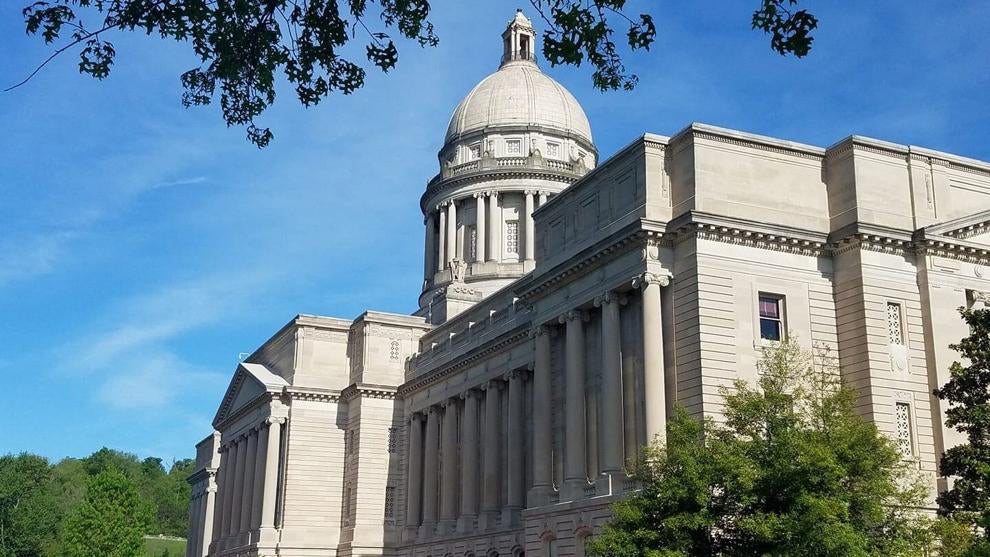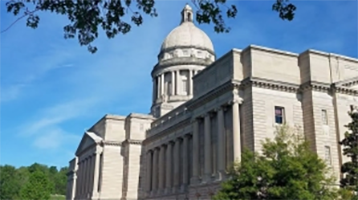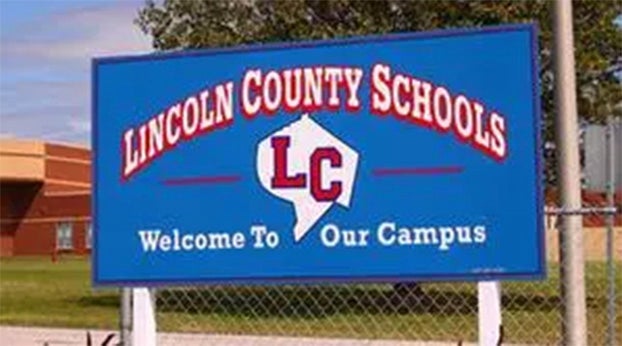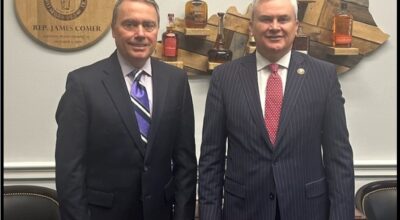What does reversal of Roe v. Wade mean for Kentucky?
Published 2:51 pm Monday, June 27, 2022
|
Getting your Trinity Audio player ready...
|
TESSA REDMOND
Kentucky Today
With the Supreme Court’s 6-3 ruling that topples Roe v. Wade and Casey v. Planned Parenthood, the issue of abortion has returned to the states. For Kentucky, that means abortion is no longer an option.

Kentucky statehouse in Frankfort. Photo by Tom Latek
“As of this morning, except where the health of the mother is at risk, abortion is no longer lawful in the commonwealth,” said Kentucky Attorney General Daniel Cameron at a press conference on Friday. “In the coming days, my office will pursue court orders that reflect this new legal reality.”
Kentucky’s trigger law, which was enacted in 2019 as House Bill 148, automatically took effect upon the overturning of Roe. Kentucky is one of 13 states where abortion ended once Roe was overturned.
The law, also known as the Human Life Protection Act, bans elective abortion in the commonwealth, but permits the procedure if a physician determines it can “prevent the death or substantial risk of death” of a pregnant woman. It also allows abortions to “prevent the serious, permanent impairment of a life-sustaining organ of a pregnant woman.”
Outside of these provisions, performing an abortion is now a Class D felony. But a woman who obtains an abortion would not be liable to any criminal prosecution or penalty.
One of Kentucky’s primary abortion providers, EMW Women’s Surgical Center, stopped performing abortions shortly after the Dobbs decision while their legal team assessed the intersection of Friday’s ruling with federal and state laws.
“The ACLU of Kentucky and its partners are prepared to file a case in state court arguing the Kentucky Constitution allows for the legal right to access abortion,” said the ACLU of Kentucky in a press release. “We will aggressively litigate this claim on behalf of our Louisville-based client, EMW Women’s Surgical Center, seeking relief from the courts that will allow all providers to resume providing abortions as soon as possible.”
EMW and Planned Parenthood in Louisville stopped providing abortions for a week in April while a challenge to House Bill 3 was pending. The multi-faceted pro-life bill was effectively blocked by a federal judge in May.
Other abortions laws enjoined in federal court include a “heartbeat bill” prohibiting abortions after a fetal heartbeat is detected, a 15-week abortion ban similar to the Mississippi legislation at the epicenter of Dobbs and a live dismemberment abortion ban that the Supreme Court ruled Cameron could continue to defend in March.
Now Cameron and his team will begin working with the court to dismiss injunctions and untangle the web of Kentucky’s abortion laws.
“The decision certainly eliminates the basis for those challenges to Kentucky’s abortion laws,” said Brett Nolan, Kentucky’s principal deputy solicitor general. “The cases don’t just go away. We have to ask courts to lift injunctions and dismiss cases, which is what we’ll plan on doing in the future.”
With abortion returned to the states, Kentucky voters will have a chance to make their voices heard on the issue come November 8.
The “Yes for Life” amendment, labeled constitutional amendment two on the ballot, would clarify that there is no right to abortion or abortion funding enshrined in the state’s constitution.
Addia Wuchner, executive director of Kentucky Right to Life, said the amendment will prevent judicial activism—similar to that which brought about Roe in 1973.
“Voting yes on constitutional amendment number two is our opportunity ensure no judge puts his own politics above the will of the people and invents a right to abortion in our commonwealth,” Wuchner said.
Jim Ewing, the advisory chairman of the Friends of Life Kentucky and pastor of First Baptist Church Calvert City, offered a statement about the decision.
“The overturn of Roe v. Wade is a blessing of God as well as a crucial step in the goal of Friends of Life Kentucky to end elective abortion across Kentucky,” he said. “I am grateful for the countless lives that will be saved by this decision, but we must never lose sight of the tragic loss of some 63 million children that were the result of an egregious decision nearly 50 years ago.
“As we approach the coming elections in November, I urge Kentucky Baptists to continue pray for our state legislators as they face the inevitable pressure to back away from their current strong pro-life stance. I also want to encourage Kentucky Baptists to vote for the proposed amendment to the Kentucky Constitution that affirms the idea that there is no specific or implied affirmation or support for abortion in our state Constitution.”
The amendment would not directly impact abortion access in Kentucky under the trigger law and other pieces of pro-life legislation, which already ban the procedure now that Roe and Casey have been overturned.
“Abortion is, for all intents and purposes, over here in the commonwealth,” Cameron said.
Republican Rep. Nancy Tate, lead sponsor of an omnibus pro-life bill passed into law in April, praised the high court’s decision, calling it a “historic and tide-turning day in the fight to protect humanity’s most innocent.”
“The Supreme Court has given the power back to the states to decide, which is how it should have always been,” Tate said. “From this moment on, states have the power to choose whether or not to uphold the sanctity of life. Abortions will now be illegal in the commonwealth, except to protect the life of the mother.”






